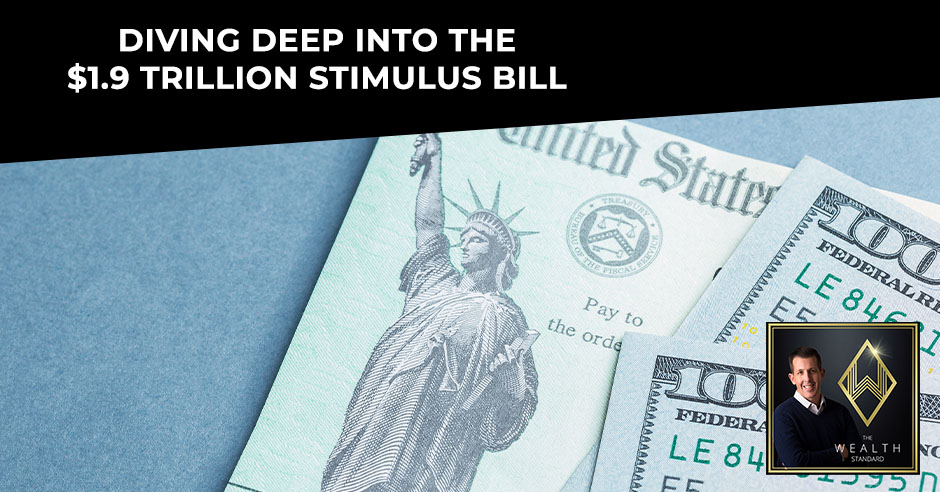
Podcast: Play in new window | Download

Just recently, the House passed the $1.9 trillion stimulus bill in the hopes of rescuing America from the economic damages brought about by the pandemic. But what does it really entail? What are the underlying consequences of putting out all of this money? In this episode, Patrick Donohoe flies solo to share with us his thoughts about this new bill. He takes a look at it from different perspectives and then offers some insights on how you can best navigate your wealth and more.
—
Watch the episode here:
Listen to the podcast here:
Diving Deep Into The $1.9 Trillion Stimulus Bill
Thank you for supporting another episode. I’m glad that you’re here. I’m going to freestyle it, I’ll be by myself. I’m going to bring on some cool guests to speak about some of the points I’ll bring up. I’m going to make some comments regarding the $1.9 trillion stimulus bill. There’s enough information out there in other podcasts that analyze the details. I’m going to approach it from a couple of different angles in hopes of inciting you a different perspective of what’s going on so that you can best navigate your wealth, your business, your profession and the enjoyment of life. I believe that is what wealth is. It’s to extract, to experience the joy in life, regardless of what’s going on, tall order. Wealth is something that most people pursue. Oftentimes when they associate it with money and material things, they come to find out that it is not what they wanted.
Best to start with what wealth truly is, which is mindset, being able to look at your circumstances, look at your life and extract the good, the beauty, the gratitude, which if you think about it is all around us. I tried to approach this $1.9 trillion bill from a more neophyte position, meaning 8-to 10-year-old who understands ideas at a certain level. I look at the $1.9 trillion package from an economics perspective, a legal perspective, a precedent setting perspective. I stepped back and I look at the first idea, which is the surface, especially the title, the American Rescue Plan is pitching this $2,800 per family and also extension of unemployment benefits. I look at how much of the bill that amount is. I’ve seen figures around 9%, 10%, even if it’s 15%. That’s where the focus has been.
It’s unfortunate because in the end, when an 8-to 10-year-old see’s candy, they see an amusement park. They see the surface benefit and don’t necessarily have the experience to look at the unintended consequences. It makes sense to me. Majority of Americans do support the bill. At the same time, I believe if they took a shovel deep look into the other points of the bill, tenets of the bill, where money is being spent, it would cause even the young person to scratch their head. $1 billion here, $10 billion here, $500 million here, things that are unrelated to COVID, but at the same time are being pitched under this umbrella that it’s necessary to rescue America. That’s the first thing that I observed is looking at this from a psychological perspective and how a bill that is monumentally massive in size.

$1.9 Trillion Stimulus Bill: The government was not set up to take care of people. It was set up to protect the rights of the people.
We’ve become desensitized to the language of money. I’m sure $1.9 million to most Americans is a lot of money. 1.9 trillion seconds ago is 60,000 years. This is a massive amount of money and it is going everywhere. If money were free that grew on trees, if it’s what most 8 to 10-year-olds think money is where you swipe a card and you get stuff, it makes sense. Who wouldn’t want all of this stuff? There are consequences for spending this money because it’s not free. Interest has to be paid on it. Principal has to be paid back. For those of you who are interested in economics, monetary policy, and monetary theory, this idea of MMT, Modern Monetary Theory, which removes some of the responsibilities associated with spending money at a government level, it’s something that is happening in a sense. This $1.9 trillion, the amount of debt that’s being piled up, it’s not possible to payback without some significant dire changes.
We’ll get into some of the precedent setting. A couple episodes back, I talked about some of the points of Biden’s fiscal ideas and specifically taxes, what’s going to change in that respect? I believe that because of how this bill was passed, $1.9 trillion, the majority of Republicans, all of them I think opposed it and all of Democrats were in favor of it to an extent. It was right down the line. It’s interesting where this sets a precedent with all their laws that are going to be pushed forward through the House, the Senate and then signed into law. It’s interesting to look at what Biden wants to push forward is going to be an inevitability. That’s the precedent that it sets. It may not be 100% absolute but close.
Going back to a couple episodes ago, whether it’s higher taxes, whether it’s removing step-up in basis for real estate, whether it’s eliminating capital gains, meaning capital gains will be treated, especially for high income earners as ordinary income. These are sweeping changes, changes to the debt tax, the estate tax, the lifetime exemptions that are available and what can be included. It’s crazy. It’s time to pay attention. There is going to be an impact. This is the precedent that it’s setting. It’s setting another precedent as well, which is one that’s way more philosophical. I’ll end with this, making this a shorter episode.
The precedent is that American people are not creative enough, hardworking enough to take care of themselves, to solve their own problems, to exercise their ingenuity, which is deep inside of everybody. This is where the precedent is dangerous. An example is an article that came out a few years ago, it was a study. It was done in Europe, somewhere Sweden, I believe. The study showed that if families had one less child, it would make a huge difference as far as the carbon footprint human beings leave. It’s an incredible claim. You can remove people and we wouldn’t have any carbon footprint. You look at the human ingenuity specific to this claim. The inventor, Bill Gross, you can look him up, has a project called Carbon Capture, which is an economical way to remove a toxic carbon dioxide from the atmosphere. If one of those children that weren’t born wasn’t Bill Gross or was Bill Gross, there’s no solution at that magnitude.
The point I’m trying to make is that when we’re put in predicaments of challenge and difficulty, we can take the easy way out and most people would, if that hand is extended. We can take another way out, a route that allows us to understand ourself at a deeper level, to understand what we’re made of. Think of the loss of fulfillment, the loss of self-respect, self-esteem knowing that you overcame challenge. It’s the feeling of rising above adversity. It’s a feeling of conquering something on the surface that you did not believe was within you, what you weren’t capable of. To me, these are the massive losses that are impossible to quantify. The precedent that’s being set is that, “When there’s challenge, don’t worry about it. You don’t have to do anything. You can sit back and relax. We’ll be there to help you.”
I don’t believe that this is an environment of growth that leads to what we’re looking for, which is a sense of self-understanding, a sense of self-reliance, respect, and having the understanding, having the knowledge that we accomplished something. We overcame something. That to me is sad. I look at the genius in everyone and how that genius is being put on the altar of sacrifice. I believe that there are circumstances where people find themselves in challenging times, maybe impossible to fend for themselves. At the same time, I think that is the exception, but we are making it the rule.
There are a couple of interviews I’m going to link to as I conclude this short episode. They were done a couple of years ago, one with Greg Lukianoff, who’s the author of The Coddling of the American Mind, another one, which is a follow-up to that book with Andy Tanner, talking about what we teach our children, the importance of challenge, of difficulty, of overcoming, and the sense that comes from overcoming, the muscle that builds. It’s important especially with what’s going on now.
As a recap what to take from this episode, number one, I look at it’s a clear path to higher taxes, to inflation, and ensuring that you ask yourself the question, “How is my wealth, my portfolio, my financial future impacted by inflation?” I’ll give you a short crash course on inflation, this $1.9 trillion in addition to the north of $100 billion that hasn’t been spent from the previous COVID stimulus bill. This is the money that will go into circulation even though it goes into areas that would make you question, “Why would we do that?” Go look at some of the details. That money is going to find its way into the business’ pockets. That business is going to buy stuff. They’re going to pay their employees, maybe give them a bonus or raise. Those employees are going to go out and spend money. This money came out of nowhere. The money was not earned. Now, we have that much more that is circulating in our economy.
When you have more money circulating and a seemingly finite amount of goods and services, what ends up happening is that more money bids up the price of assets, of goods and services. We’ve seen that already and we’re going to see even more of that. What that means is that the money you have, the money you earned, the value of your assets, your wealth will be buying less stuff in the future because those things have gone up in price. That’s the nature of stimulus and inflation, higher prices. You can also define inflation as the devaluation of the dollar. That’s the first thing.
We have a prime opportunity as human beings to grow, to thrive, and to learn. Click To TweetThe second thing is legislation that is coming down the pipe, whether it’s taxes or otherwise that is being pushed forth by the administration. We see that a precedent has been set where they can pass laws that are highly controversial. They can pass measures that are highly controversial. Pay attention and start setting up your tax strategy to help you keep more of the money that you’ve earned. Finally, it’s the context of challenge and hardship. I’m not debating that there isn’t hardship. I’m not debating that COVID hasn’t made an impact or the response to COVID has not made an impact. It has. It is evident, not just the United States but around the world.
I remind myself that government was not set up to take care of people. Government was set up to protect the rights of people. People have done some incredible things over the course of time. In this day and age with access to limitless information, resources, knowledge, we can debate the definition of knowledge, but finding solutions, whether it’s YouTube, books, blogs, podcasts, the majority of which is free if not insanely inexpensive. People have the resources to solve problems. At the same time, when resources aren’t needed, they are rarely taken advantage of. Water is not valuable until you’re in the middle of a desert and thirsty, or running a race. It’s the environment where resources become valuable.
We have a prime opportunity as human beings to grow, to thrive, to learn, not just for our own betterment and the remuneration that comes tangibly materially but it’s the feeling, the sensation. It’s the understanding we have about ourselves about what we’re made of. I think we all thirst for that. In essence, we’re being robbed of that because of what’s going on, where governments are taking care of us. They’re solving our problems. They’re giving us handouts. As I look at it from an 8 to 10-year-old, I can see on the surface that the bill makes sense, the narrative makes sense. As 8 to 10-year-old, maybe 12-year-old, when you realize you’ve been deceived or screwed, you’re going to be pissed. I look at the emotions that are going on in the social and political atmosphere. They’re high, it’s tense.

$1.9 Trillion Stimulus Bill: People have the resources to solve problems. At the same time, when resources aren’t needed, they are rarely taken advantage of.
This is by no means to incite more of what doesn’t serve you, but it’s to make you even more aware of what’s going on, to navigate your life where you’re not dependent on others, you’re not dependent on handouts. You’re dependent on yourself. It’s to take actions, to make efforts to those ends. Thanks for reading. I appreciate the support. Tune in to the next couple of episodes. We’re going to be talking politics. We’re going to be talking tax strategy and some investment strategy given what’s going on with our environment, specifically how the tax implications could impact your investment strategy or wealth strategy, and some ideas of how to remedy that. Until next time, take care. Bye.
Important Links:
- https://www.Cato.org/commentary/were-paying-19-trillion-what
- https://www.CovidMoneyTracker.org/
- https://TheWealthStandard.com/the-coddling-of-the-american-mind-and-learning-to-evaluate-ideas-with-andy-tanner/
- https://TheWealthStandard.com/free-speech-individual-rights-and-education-with-greg-lukianoff/
- Bill Gross
- The Coddling of the American Mind
Love the show? Subscribe, rate, review, and share!
















